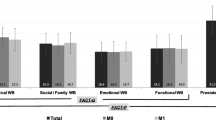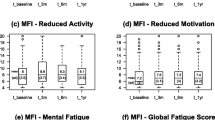Abstract
Background
Cancer-related fatigue is a significant clinical problem and is a symptom commonly experienced by patients with differing cancer types during and following treatment. It is a distressing symptom which interferes with functioning in daily life. However, much less is known about the prevalence and severity of fatigue in prostate cancer when compared to other cancer types, such as breast cancer.
Methods
A systematic review was conducted to appraise the prevalence and severity of cancer-related fatigue in prostate cancer. Systematic searches of published quantitative research relating to the prevalence and severity of fatigue were conducted using databases, including Medline, PsychINFO, CINAHL and ISI Web of Knowledge (January 2012). Included papers measured the prevalence or severity of prostate-cancer-related fatigue and differentiated fatigue outcomes (prevalence, severity) between treatment modalities.
Results
Nineteen studies were eligible for the review, of which 17 were cross-sectional and 2 longitudinal. Findings suggest that the prevalence of any fatigue is as high as 74 %, whilst chronic fatigue prevalence was highest (39 %) when hormone therapy was combined with radiotherapy. Fatigue severity is reported as worse in hormone therapy and treatment combining hormone therapy and radiotherapy.
Conclusions
Fatigue is a common symptom for men with prostate cancer, particularly those prescribed hormone therapy. A wide variety of tools were used to measure fatigue prevalence and severity, which made comparisons across studies difficult. The review is limited by methodological shortcomings in the studies included.


Similar content being viewed by others
References
Jemal A, Bray F, Center MM, Ferlay J, Ward E, Forman D (2011) Global cancer statistics. CA Cancer J Clin 61(2):69–90
Sonn GA, Sadetsky N, Presti JC, Litwin MS (2009) Differing perceptions of quality of life in patients with prostate cancer and their doctors. J Urol 182(5):2296–2302
Servaes P, Verhagen C, Bleijenberg G (2002) Fatigue in cancer patients during and after treatment: prevalence, correlates and interventions. Eur J Cancer 38(1):27–43
National Comprehensive Cancer Network Practice Guidelines. Cancer-related fatigue guidelines, version 1.2012. National Comprehensive Cancer Network, Inc. 2011. (Available at http://www.nccn.com.org). Accessed 12 Jan 2012
Stone P, Hardy J, Huddart R, A’Hern R, Richards M (2000) Fatigue in patients with prostate cancer receiving hormone therapy. Eur J Cancer 36(9):1134–1141
Haylock PJ, Hart LK (1979) Fatigue in patients receiving localized radiation. Cancer Nursing 2(6):461–468
Pluye P, Gagnon M-P, Griffiths F, Johnson-Lafleur J (2009) A scoring system for appraising mixed methods research, and concomitantly appraising qualitative, quantitative and mixed methods primary studies in Mixed Studies Reviews. Int J Nurs Stud 46(4):529–546
Choo R, Pearce A, Danjoux C, Morton G, Deboer G, Szumacher E et al (2007) Prospective evaluation of quality of life in prostate cancer patients receiving combined treatment of postoperative radiotherapy plus androgen suppression for PT3 or positive resection margin after radical prostatectomy. Eur Urol 52(6):1645–1652
Danjoux C, Gardner S, Fitch M (2007) Prospective evaluation of fatigue during a course of curative radiotherapy for localised prostate cancer. Supportive Care in Cancer 15(10):1169–1176
Fransson P (2008) Quality of life for members of Swedish Prostate Cancer Patient Associations. Cancer Nursing 31(1):23–31
Geinitz H, Thamm R, Scholz C, Heinrich C, Prause N, Kerndl S et al (2010) Longitudinal analysis of quality of life in patients receiving conformal radiation therapy for prostate cancer. Strahlentherapie Und Onkologie 186(1):46–52
Goedendorp MM, Gielissen MFM, Verhagen CAH, Peters MEJW, Bleijenberg G (2008) Severe fatigue and related factors in cancer patients before the initiation of treatment. Br J Cancer 99(9):1408–1414
Herr HW, O'Sullivan M (2000) Quality of life of asymptomatic men with nonmetastatic prostate cancer on androgen deprivation therapy. J Urol 163(6):1743–1746
Hervouet S, Savard J, Simard S, Ivers H, Laverdiere J, Vigneault E et al (2005) Psychological functioning associated with prostate cancer: cross-sectional comparison of patients treated with radiotherapy, brachytherapy, or surgery. J Pain Symptom Manage 30(5):474–484
Humpel N, Iverson D (2010) Sleep quality, fatigue and physical activity following a cancer diagnosis. Eur J Cancer Care 19(6):761–768
Joly F, Alibhai SMH, Galica J, Park A, Yi QL, Wagner L et al (2006) Impact of androgen deprivation therapy on physical and cognitive function, as well as quality of life of patients with nonmetastatic prostate cancer. J Urol 176(6):2443–2447
Kyrdalen AE, Dahl AA, Hernes E, Cvancarova M, Fossa SD (2010) Fatigue in hormone-naive prostate cancer patients treated with radical prostatectomy or definitive radiotherapy. Prostate Cancer and Prostatic Diseases 13(2):144–150
Kyrdalen AE, Dahl AA, Hernes E, Hem E, Fossa SD (2010) Fatigue in prostate cancer survivors treated with definitive radiotherapy and LHRH analogs. Prostate 70(13):1480–1489
Marchand V, Bourdin S, Charbonnel C, Rio E, Munos C, Campion L et al (2010) No impairment of quality of life 18 months after high-dose intensity-modulated radiotherapy for localized prostate cancer: a prospective study. Int J Radiat Oncol Biol Phys 77(4):1053–1059
Monga U, Kerrigan AJ, Thornby J, Monga TN (1999) Prospective study of fatigue in localized prostate cancer patients undergoing radiotherapy. Radiat Oncol Investig 7(3):178–185
Pirl WF, Greer JA, Goode M, Smith MR (2008) Prospective study of depression and fatigue in men with advanced prostate cancer receiving hormone therapy. Psycho-Oncology 17(2):148–153
Storey DJ, McLaren DB, Atkinson MA, Butcher I, Liggatt S, O'Dea R et al (2012) Clinically relevant fatigue in recurrence-free prostate cancer survivors. Ann Oncol 23(1):65–U1
Truong PT, Berthelet E, Lee JC, Petersen R, Lim JTW, Gaul CA et al (2006) Prospective evaluation of the prevalence and severity of fatigue in patients with prostate cancer undergoing radical external beam radiotherapy and neoadjuvant hormone therapy. Can J Urol 13(3):3139–3146
Ukoli FA, Lynch BS, Adams-Campbell LL (2006) Radical prostatectomy and quality of life among African Americans. Ethnicity & Disease 16(4):988–993
Vogelzang NJ, Breitbart W, Cella D, Curt GA, Groopman JE, Horning SJ et al (1997) Patient, caregiver, and oncologist perceptions of cancer-related fatigue: results of a tripart assessment survey. Semin Hematol 34(3):4–12
Stone P, Richardson A, Ream E, Smith AG, Kerr DJ, Kearney N et al (2000) Cancer-related fatigue: inevitable, unimportant and untreatable? Results of a multi-centre patient survey. Ann Oncol 11(8):971–975
Curt GA (2000) Impact of fatigue on quality of life in oncology patients. Semin Hematol 37(4):14–17
Jacobsen PB, Donovan KA, Vadaparampil ST, Small BJ (2007) Systematic review and meta-analysis of psychological and activity-based interventions for cancer-related fatigue. Heal Psychol 26(6):660–667
Whitehead L (2009) The measurement of fatigue in chronic illness: a systematic review of unidimensional and multidimensional fatigue measures. J of Pain and Symptom Manage 37(1):107–128
Appling S, Scarvalone S, MacDonald R, McBeth M, Helzlsouer K (2012) Fatigue in breast cancer survivors: the impact of a mind–body medicine intervention. Oncology Nursing Forum 39(3):278–286
Ligibel JA, Partridge A, Giobbie-Hurder A, Campbell N, Shockro L, Salinadri T et al (2010) Physical and psychological outcomes among women in a telephone-based exercise intervention during adjuvant therapy for early stage breast cancer. J Womens Health 19(8):1553–1559
Fillion L, Gagnon P, Leblond F, Gelinas C, Savard J, Dupuis R et al (2008) A brief intervention for fatigue management in breast cancer survivors. Cancer Nursing 31(2):145–159
Yates P, Aranda S, Hargraves M, Mirolo B, Clavarino A, McLachlan S et al (2005) Randomized controlled trial of an educational intervention for managing fatigue in women receiving adjuvant chemotherapy for early-stage breast cancer. J Clin Oncol 23(25):6027–6036
Baumann FT, Zopf EM, Bloch W (2012) Clinical exercise interventions in prostate cancer patients—a systematic review of randomized controlled trials. Supportive Care in Cancer 20(2):221–233
Thorsen L, Courneya KS, Stevinson C, Fossa SD (2008) A systematic review of physical activity in prostate cancer survivors: outcomes, prevalence, and determinants. Supportive Care in Cancer 16(9):987–997
Badger TA, Segrin C, Figueredo AJ, Harrington J, Sheppard K, Passalacqua S et al (2011) Psychosocial interventions to improve quality of life in prostate cancer survivors and their intimate or family partners. Qual Life Res 20(6):8
Acknowledgments
This work was supported by Knowledge Transfer Partnerships provided by the Technology Strategy Board to enable businesses to innovate and grow using University expertise. This project was also supported by the Economic and Social Research Council as part of Knowledge Transfer Partnerships.
Conflict of interest
The authors declare no conflict of interest.
Author information
Authors and Affiliations
Corresponding author
Rights and permissions
About this article
Cite this article
Langston, B., Armes, J., Levy, A. et al. The prevalence and severity of fatigue in men with prostate cancer: a systematic review of the literature. Support Care Cancer 21, 1761–1771 (2013). https://doi.org/10.1007/s00520-013-1751-5
Received:
Accepted:
Published:
Issue Date:
DOI: https://doi.org/10.1007/s00520-013-1751-5




